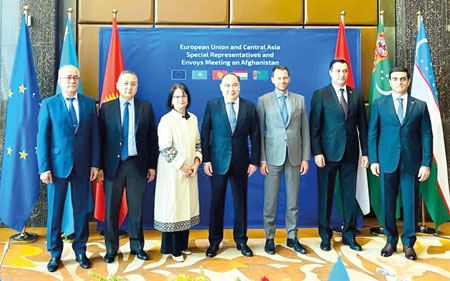The participants of the first regional Central Asia-European Union (EU) high-level meeting expressed their common concerns over the situation in Afghanistan.
According to the meeting’s statement, the participants stressed the importance of the promotion of and respect of human rights and fundamental freedoms of all Afghans, in particular women, girls and minorities.
“The participants expressed common concern over the situation in Afghanistan and recognized the need to expand interaction in providing humanitarian aid to the Afghan people. The participants stressed the importance of the promotion of and respect for human rights and fundamental freedoms of all Afghans, in particular women, girls and minorities, and the establishment of an inclusive and representative government,” the statement reads.
The first regional Central Asia-European Union (EU) high-level meeting with the participation of leaders of five Central Asian states and European Council President Charles Michel was held in Astana on Oct. 27, the European Council said in a statement.
Astana, in Kazakhstan, hosted this meeting, which began on Thursday and ended on Friday.
Analysts said that it is crucial to hold such regional meetings about Afghanistan.
“As brothers and neighbors, the nations and governments of Central Asia have a tremendous responsibility to cooperate in alleviating the humanitarian crisis in Afghanistan,” said Siddiq Mansour Ansari, a political analyst.
TOLOnews was unable to obtain a comment from Islamic Emirate officials, although Kabul has previously made statements that the government upholds the rights of the citizens.
The President of the Republic of Kazakhstan, Kassym-Jomart Tokayev, President of the Kyrgyz Republic Sadyr Zhaparov, President of the Republic of Tajikistan Emomali Rahmon, President of the Republic of Uzbekistan Shavkat Mirziyoyev and President of Turkmenistan Serdar Berdimuhamedov (represented by Turkmenistan’s Deputy Chair of the Cabinet of Ministers) and President of the European Council Charles Michel participated in the first regional high-level meeting in Astana.
Meanwhile, Nasir A. Andisha, the permanent envoy of Afghanistan to the UN in Geneva, at the UN Human Rights session said that the international community’s efforts have come to a deadlock in the last ten months of interaction with the Islamic Emirate.
According to Andisha, human rights violations, women being excluded from work and education, and restrictions on women have caused the international community to become frustrated with the Islamic Emirate.
“Over the past ten months the international community is using every possible means to engage with the Taliban, but unfortunately it appears that all efforts are approaching a dead end, a cul-de-sac filled with broken promises and deep disappointments,” said Nasir A. Andisha, Permanent Representative of Afghanistan to the UN in Geneva.
At the 50th Annual UN Human Rights Session, countries and representatives of human rights organizations discussed the state of the world’s interactions with the Islamic Emirate, the “systematic exclusion of women from society,” and the “deteriorating human rights situation.”
“We want to speak to the Taliban ourselves, we know what our people need —I call on the de facto authorities to honor their commitments to women’s rights to urgently create a meaningful dialogue with Afghan women and to listen to their voices. Excellencies, during my visit I recognized the significance of the general amnesty granted to the former officials,” said Michelle Bachelet, the High Commissioner for Human Rights.
“In Afghanistan, the Taliban have appointed a government of men, closed girls’ schools, banned women from showing their faces in public and restricted their rights even to leave their own homes. Nearly 20 million Afghan women and girls are being silenced and erased from sight,” said the UN Secretary-General Antonio Guterres.
The Islamic Emirate’s spokesman, Zabiullah Mujahid, denied there were violations of human rights in Afghanistan, saying that the rights of Afghans have been ensured now better than before.
International Human Rights Watch earlier urged the international community, particularly the UN, to take serious action against the Islamic Emirate in consideration of reports of widespread human rights violations, restrictions on women, and the barring of girls from school.—Tolonews










